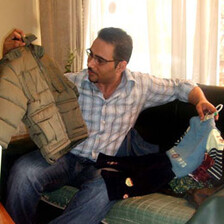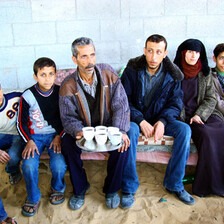The Electronic Intifada 24 July 2024

Palestinians were ordered by the Israeli army to evacuate the eastern part of Gaza City, 7 July.
APA imagesOmar Shubaki and his large family were forced to leave their home east of Gaza City because of the indiscriminate bombardment by Israeli jets, tanks, drones and quadcopters on 7 July.
He had stayed in his house, along with 25 family members, throughout the Israeli military’s previous attacks on the al-Daraj neighborhood.
After the July attacks, they moved to the al-Rimal neighborhood near the United Nations Relief and Works Agency headquarters west of Gaza City.
“I saw thousands of people were fleeing in the streets crazily and lost not knowing where to go,” Shubaki said. “But we all were forced to follow deceitful Israel’s orders to head to the west.”
While on the way there, Shubaki saw scenes of horror: children crying in the streets, looking for their parents, and people weeping and screaming out in agony.
The Israeli army relentlessly bombed the al-Rimal neighborhood soon after Shubaki and his family arrived. They thought it would be the last night of their lives.
The constant explosions illuminated the house they were staying in and had it shaking all night. Shrapnel flew so close that Shubaki and his family hid in a room for protection. The women and men in the house huddled together and embraced their children and grandchildren, who cried and recited the Quran.
They didn’t sleep that night as the explosions became more intense and closer to their house.
When they attempted to leave, Shubaki said, soldiers in tanks fired at them. They weren’t hit, but others around them were dropping like flies.
Israeli missiles, quadcopters and tanks continued to attack people, and a kind of military jet that they had never before seen dropped bombs.
“They instructed us to go to the al-Rimal area where they intended to surprise us with heinous attacks and to kill us in cold blood after we had all gathered in this place after being humiliated, displaced, thirsty and starved,” Shubaki said.
He and his family members avoided being hit by Israeli fire and eventually sheltered at a school in Jabaliya, located north of al-Rimal.
One day later, the Israeli military dropped leaflets ordering them, along with many others, to evacuate to the south.
“Israel is trying to empty Gaza of people just to annex it to include it in its so-called state built on our stolen lands in 1948 and from the West Bank,” Shubaki said.
“They don’t know that we won’t repeat the same mistake our ancestors made in 1948 and leave the north.”
Shubaki vowed to return to his home after the Israeli military withdrew.
“I won’t leave it once again,” he said. “We will stay in the north.”
Whereabouts of wife and children unknown
Hani al-Helo headed with his wife and three children to a school in the Tal al-Hawa neighborhood of Gaza City after being forced to leave their house in the al-Sabra neighborhood.
Al-Helo says he was surprised by the horrible sound of unstoppable nearby explosions that lasted for hours on 7 July, followed by closer intense shelling.
He said he felt deceived by the Israeli army’s claims that the west of Gaza was safe.
“They forced us to leave our home and neighborhood that we didn’t leave before and made a trap for us here in the al-Rimal neighborhood,” he said, adding that he won’t let the Israeli military’s brutality humiliate him.
Al-Helo and all the men sheltering in the school decided to flee without their children and wives.
“Staying in a school, a place under a roof and having doors, is much better for our women than to be thrown in the streets under random bombardment everywhere,” al-Helo said.
“I hugged my children and kissed my wife on her head,” he said.
Al-Helo feared he would be detained, thus depriving his family of its only breadwinner. After fleeing, he stayed in the street for days until he found a damaged house that was intact enough to serve as a shelter for his family.
He sought to contact his wife to tell her the address of their new “home,” since the presence of the Israeli tanks and soldiers prevented him from going back to the school in person.
“I had no choice but to message her on the phone, sending her the address in the hope she would see it and come to the destination,” he said.
He didn’t hear back from her, and when he was finally able to reach the school after the Israeli army’s withdrawal, he didn’t find his family there.
Al-Helo is worried that the Israeli army forced them to head south via the alleged safe roads where, he said, many people are being killed by snipers, attacked by military dogs or detained.
But he doubts his wife would follow orders to move south. Day and night, he prays to be reunited with his family.
“We promised each other if we want to leave the north, it would be together to heaven,” he said.
Returning home to stay
Muhammad Salman, 25, was being treated at al-Ahli hospital when the evacuation order arrived on 7 July. He had been at the hospital for a week due to injuries sustained during Israel’s invasion of Shujaiya on 27 June.
Salman’s cousin carried him on his back, as he could not walk on his injured leg, to a closed clothing store in the Tal al-Hawa neighborhood. They took shelter there during the Israeli attacks.
“We heard the collapse of buildings over people as they were screaming, and then their screams disappeared,” he said.
The attacks forced them to leave the shop. Shortly after they did so, it was leveled by an Israeli missile.
From the inside of another building, Salman and his cousin witnessed people fleeing. Some fell on the ground, where they would likely bleed to death or be run over by tanks. Their bodies would be eaten by dogs or left to decompose.
They hid in an abandoned building for a day. Then the Israeli army dropped leaflets ordering people to move south.
“We didn’t care about their threats and headed to a school in the al-Shati camp to take shelter temporarily,” Salman said.
“We have lived through all the worst kinds of suffering in the north – all kinds of loss, killing, detention and torture and starvation over the past five months just to leave the north now.”
He said he was able to return to Shujaiya, the neighborhood in which he has spent his life, after the Israeli army announced its withdrawal on 11 July.
“I am lucky that I found a habitable room in our destroyed building where my cousin and I decided to stay,” he said.
“We won’t leave our houses, neighborhoods and all the north, even if all of them were destroyed. We accept to live on their rubble. We accept to move from place to place in the north, but not outside of it.”
“We won’t leave it at all, even if it costs us our lives.”
Khuloud Rabah Sulaiman is a journalist living in Gaza.





